#not as a piece of literature representing a people
Explore tagged Tumblr posts
Text
There’s really something about the Steppe (and landscape in general) as described by novels about the Khmelnytsky Rebellion that hits different
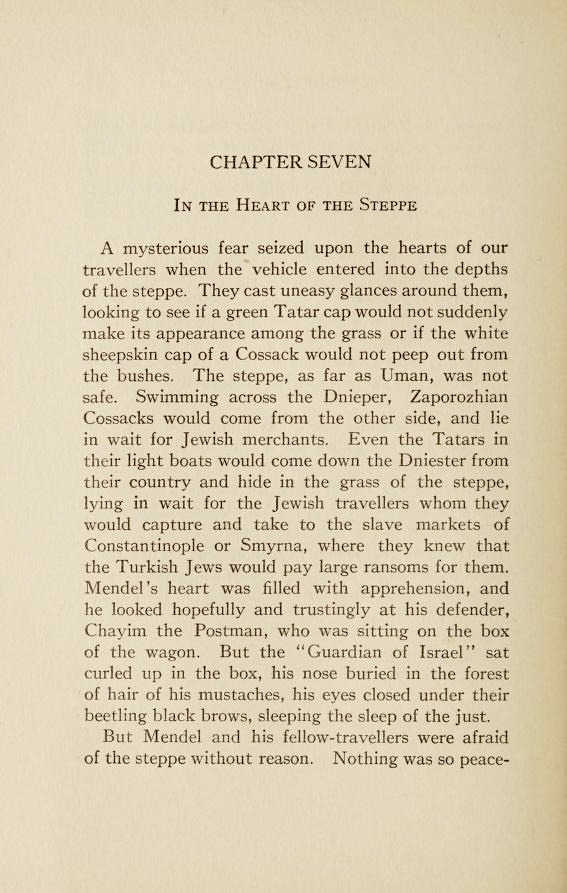
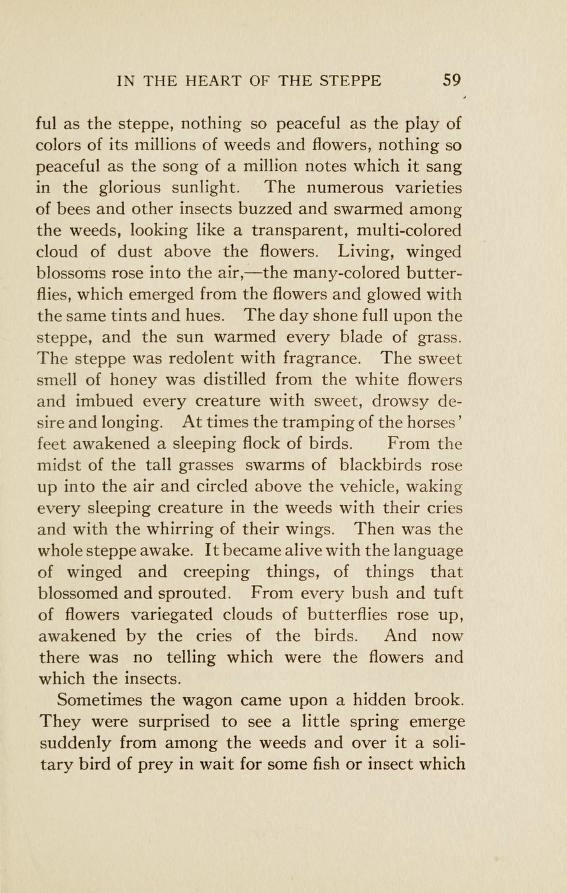
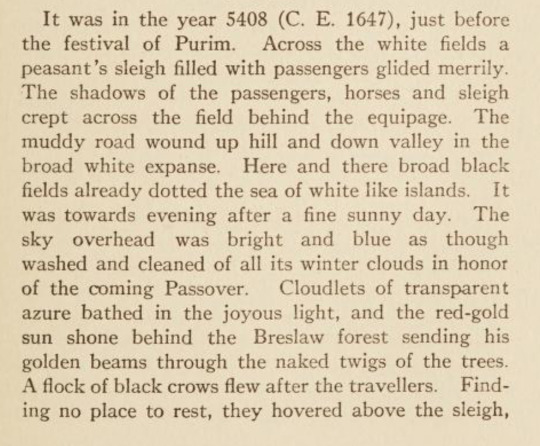

Q: For novels about Zaporozhian Cossacks, we obviously have Ogniem i mieczem (Polish), Kiddush Ha-Shem (Jewish), and Taras Bulba (complicated, but Gogol’s Ukrainian). But is there an ethnic Tatar perspective in a novel somewhere?
(Specifying novels, rather than books, since I’m specifically looking for ideological biases in fictional portrayals, as reflected in all three above.)
#I don’t want to make any Ukrainian have to own ‘Taras Bulba’ if they don’t want to#not as a piece of literature representing a people#especially given the 2009 movie#khmelnytsky rebellion#kiddush ha-shem#sholom ash#ogniem i mieczem#trylogia#tags to reach out#Ukrainian cossacks#cossack history
43 notes
·
View notes
Text
I relate to your enjoyment of seeing code-switching represented on a TV show so I decided I do want to reblog this since I like the overall message of your post. Originally I did just wanna let it slide, but I can't reblog this in good conscience without commenting on one of your tags:
I don't think The Expanse as a whole is that much about settler-colonialism as it is about exploitative colonialism and in turn about imperialism in general. Granted, I haven't finished reading Babylon's Ashes yet as I'm writing this post, so maybe the Laconia plot is very settler-colonialist and I'm talking out of my ass here. If that's the case I apologize. But if it's not I just want to say this: In the Expanse canon Ganymede, Io or Ceres weren't settled by any living organism known to humans before humans gained the technology necessary to expand from earth out into the SOL system and colonized it. It's just plain "old" colonialism, which is impossible to have back on earth since every imperial expanding superpower in history colonized parts of earth that were already settled by other people. I get that from an US-American perspective "settler colonialism" is a big buzz word, but not every piece of literature is meant to be read as a metaphor for the US. In a way The Expanse's main message is one of anti-imperialism.
One of the things that i really really love about the expanse is the attention it pays to the language the characters speak. Obviously for practicality reasons the belters have to speak mostly english but the little bits of belter creole we get here and there are so distinct and feel so lived in, and i love that the show just. Refuses to translate them. You just kind of pick up the dialect over time.
I also really love the care that was put into the characters accents. Like i dont know if ive ever watched a show where a character audibly code switches like Naomi Nagata does. When we meet her she's speaking pretty standard English but when she's back with other belters her accent comes on pretty strong. Which is so cool! I feel like the only time we see characters with more than one accent is when one of them is fake because theyre like. In disguise or pretending to be someone else. Its really cool to see a character who just talks differently in different situations and it makes the whole world feel so grounded and real even tho obviously theyre like. In space.
#thoughts#the expanse#code-switching#belter creole#lang belta#linguistics#linguistic imperialism#creole languages#colonialism#exploitative colonialism#settler colonialism#imperialism#anti-imperialism#history
130 notes
·
View notes
Note
How would one go about making an intersex character
That's a big question, and I want to emphasize that I'm only one person, and I can only speak for my own personal experiences. There is no one-size-fits-all guide to this sort of thing.
My advice is therefore the same as it would be for writing any character whose identity you don't share:
Understand that you might fuck it up, but don't let it stop you from trying. No group is a monolith, and what resonates with one member of a group might be considered shitty representation by another member of that group. You're never going to make everyone happy, so instead of trying to make the "perfect representation," try to approach things with the mindset that nothing will ever be perfect. The goal is to have a wide variety of respectful representation, not create the Perfect Rep.
Engage with media created by people who share the identity you want to represent. You can't write a respectful piece of representation if you don't know how anyone in that group is representing themself.
Research activism connected to the identity you want to represent. What are the offensive stereotypes you should avoid? What kinds of sociopolitical issues affect this group of people? Are there any organizations dedicated to activism and support for this group, and have those organizations made any resources for allies?
Work with a sensitivity consultant, and preferably more than one if you can. Many people do this as a paid service, but there are plenty of people who are willing to arrange some kind of trade if financial hardship is an issue. If you absolutely cannot manage to get a consultant for whatever reason, doing your own research becomes even more important.
Since you asked about intersex representation specifically, let me help you get started with some relevant links:
InterAct's Intersex FAQ
InterAct's collection of informative brochures & guides
Intersex Human Rights Australia: Celebrating Intersex Firsts on TV
JSTOR: Intersex Narratives: Shifts in the Representation of Intersex Lives in North American Literature and Popular Culture, by Viola Amato
Human Rights Campaign: Understanding the Intersex Community
GLAAD Media Reference Guide: Intersex People
1K notes
·
View notes
Text
I could never understand people who treat DSMP like a dead fandom or feel ashamed of still adoring this piece of media in 2024. After all, isn’t the whole point of enjoying any story to keep it in your heart for years instead of forgetting about it the moment it loses its popularity? How did classical literature or old movies/series survive and remain appreciated until today, for example? The DSMP fandom is alive because there still are people who deeply care about the characters, and it will keep on living until there’s at least one person passionate about it.
It is true that the DSMP fandom was bigger in 2020-2022, but it’s also important to remember the quality of the fanbase at the time. I remember seeing so much more harassment, especially directed towards people interested in portraying c!Prime’s canonically abusive dynamic without even exploring the aspect of /p physical affection; many people were forced to deactivate their accounts because of the insane amount of toxic reactions. There were also A Lot of people incapable of understanding that CC’s characters weren’t supposed to represent their real life personalities, which either led to certain CC’s harassment for being “horrible people” or to misinterpretation of certain characters (e.g. c!Dream, c!George, c!Sapnap, c!Quackity, or c!Sam), a huge amount of poor lore comprehension, leading to Lots of victim-blaming and abuse apologism.
Now that DSMP is over and less popular, a significant amount of people responsible for the fandom’s poor reputation is gone, and people who genuinely understand the characters and simply want to discuss and/or create content for their hyperfixation in peace, stayed. Of course, this fandom isn’t perfect or entirely free of Weird™ people, but there’s certainly less toxicity, and it’s all that matters.
The next time you feel ashamed of still enjoying DSMP, try to remind yourself of the wonderful memories, excitement, creativity boost, and friends it brought you, and focus on the fact that this story will remain alive for as long as you let it.
492 notes
·
View notes
Text
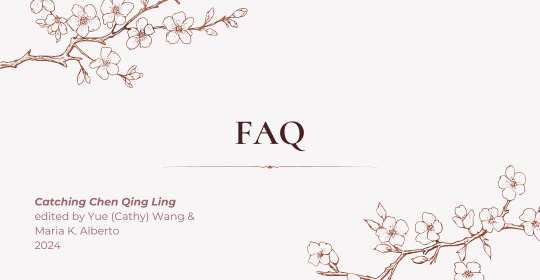
You have questions! We might have answers.
What is this collection?
As Maria puts it: this collection is a critical look at some of the things that we, the editors, think have made CQL such a hit around the world. Of course, part of that success comes from the webnovel MDZS and the show CQL themselves—we love the characters, the mystery, and the drama, who doesn’t?! However, the authors in our book also look at topics like translating danmei (both officially and unofficially), adapting danmei for new audiences, and interacting with fandoms and fanworks. The larger argument of the book is that all of these things played a huge role in CQL’s visibility and success, and we wanted to start making those moving pieces visible, especially for audiences who mainly watched CQL in translation.
You keep using the word “academic”—what does that mean, exactly?
Maria: Ok, not to get pedantic here, but this actually touches on some things that I’m really excited about for the book. Traditionally, academic work is written by people who have a deep expertise in the subject (signified by having a PhD and doing specific kinds of research), and then the work itself is peer-reviewed (i.e., sent to other experts in the field for them to evaluate whether it’s sound, original, and interesting enough to publish, without knowing who wrote it). And both of these things are true about our book—our authors have deep knowledge and the book was peer reviewed—but also. We specifically asked for chapters from younger scholars and from fans who also have deep knowledge about topics that academia doesn’t always know or value enough, and we include an interview from the fan-translator K. who did the Exiled Rebels translation. So the hope is that: this book is academic, and also—more!
Who are you?
Yue studies adaptation, fantasy, and popular culture texts using a feminist lens. She wrote an early, influential article about danmei adaptations and also has a book about feminist adaptations of Chinese fantasy.
Maria studies fanworks, contemporary fantasy, and genre literature. She’s scrambling to finish her dissertation right now.
How were the chapter spotlights chosen?
Voluntarily! The concept of a small social media promo was kicked around by some of the contributors and those interested in the idea filled out a short interview with what they wanted to share. We'll be posting about 2 introductions and 2 spotlights a day for the next week or so!
Who's running this social media campaign anyway?
Not the publishers! A few enthusiastic collection contributors got together and, with the assistance of the editors, have put this promotion together. We do not in any way represent Peter Lang in an official capacity! We just worked hard and wanted to share. :)
Are you making any money off of royalties from this book?
LOL not even remotely
What about this promotion?
also no. alas
Where can I find this book?
You can find our listing on Peter Lang’s website here. As for other retailers, a quick search should turn us up!
How can I access this book if I cannot buy it from Peter Lang / [book retailer of choice]?
As collection editors and contributors who signed a legal agreement with Peter Lang, we have granted Peter Lang exclusive right and license to edit, adapt, publish, reproduce, distribute, display, and store our contributions, and we must cooperate fully with the Publisher if the Publisher believes a third party is infringing or is likely to infringe copyright in the contribution.
That being said, these are academic papers, which means that contributors may make copies of the contribution for classroom teaching use! (These copies may not be included in course pack material for onward sale by libraries and institutions). Of course, any linking, collection or aggregation of chapters from the same volume is strictly prohibited.
(FAQ may be updated periodically!) (all posts on Catching Chen Qing Ling)
#MDZS#CQL#The Untamed#Grandmaster of Demonic Cultivation#Catching Chen Qing Ling#CQL academic collection#CQL CFP#Chen Qing Ling#Mo Dao Zu Shi#CQL meta#MDZS meta
353 notes
·
View notes
Text



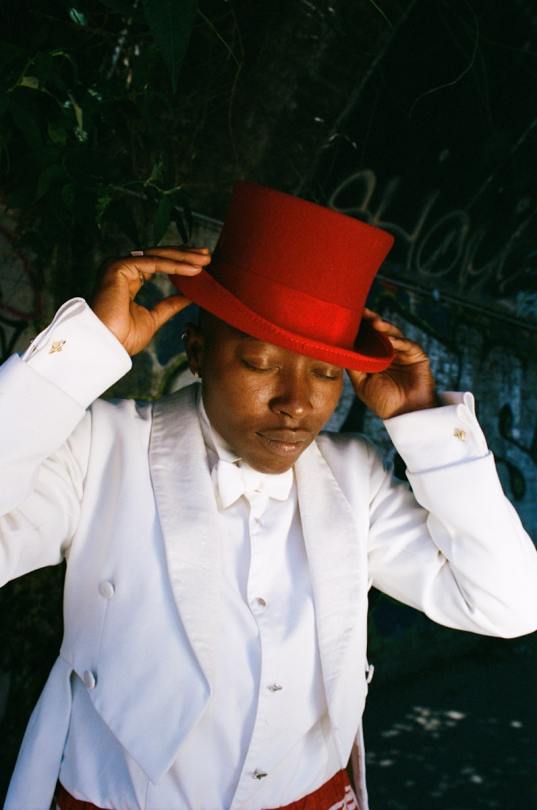
When photographer and filmmaker Grace Pickering was introduced to the work of trans activist Lou Sullivan, it completely changed their life. Born in 1951, Sullivan is thought of as the world’s first documented gay trans man – though, of course, trans people have likely been around for far, far longer. His collated diaries from 1961 – 1991, We Both Laughed in Pleasure, are a pioneering piece of queer literature, or “a radical testament to trans happiness,” as The New Yorker once put it. “Before learning about Lou, I didn’t really understand my identity,” Grace says over breakfast at the art’otel in Hoxton, East London. “He opened my mind up to the fact that so many of my own thoughts were related to my transness – that you could be a dyke fag, I think is the term. He put everything into perspective for me.” It makes sense, then, for Grace to have named their first solo exhibition after Lou’s seminal work. We Both Laughed in Pleasure, which opened last week at the art’otel, is based around a short film Grace shot of their friends and peers, in a bid to shed light on a lesser known facet of the trans experience: transmasculinity and, crucially, transmasc people whose lives are full – of joy, friendship, professional and romantic success. “I wanted to show the nuanced lives that people have,” Grace continues. “Whenever I see transmasc people represented, it’s in quite a stereotypically male way, which I know sounds quite funny. But I think being transmasc is its own thing – me and my friends identify as gay men, even though out in the world I will more than likely be treated as a woman. It’s a different culture.” Alongside the film, which was produced by Greatcoat Films and commissioned by art’otel, Grace will exhibit a series of images inspired by historical trans and nonbinary figures, such as Joan of Arc, who has often been thought of as gender non-conforming; Schuyler Bailar, the legendary openly trans swimmer; and Gladys Bentley, a Harlem musician who would regularly get thrown into jail for the way they dressed in the 1930s. “Gladys would play at jazz clubs and was infamous in that area,” Grace says. “The police would routinely raid the place and arrest them. Gladys would spend the night in a cell and come right back the next day, in their three-piece suit and top hat. And yet they’ve been historically written about as a butch lesbian, despite living as a man. I was interested in showing that.”
from Down in the dumps? Laugh in pleasure at this exhibition
229 notes
·
View notes
Text
The Romanticism of One Piece VII: The Sea, and Conclusion
AO3 Part I Part VI
“Whenever I find myself growing grim about the mouth; whenever it is a damp, drizzly November in my soul; whenever I find myself involuntarily pausing before coffin warehouses, and bringing up the rear of every funeral I meet; and especially whenever my hypos get such an upper hand of me, that it requires a strong moral principle to prevent me from deliberately stepping into the street, and methodically knocking people's hats off - then, I account it high time to get to sea as soon as I can.” —Herman Melville
There is nothing more Romantic than to yearn for the sea. In his book Image of the Sea: Oceanic Consciousness in the Romantic Century, Howard Isham describes what he calls the “cosmic liquescence” that artists, writers, and musicians so often tapped into during the Romantic era. These were the last days of the sail, the world teetering on the edge between eras. To be alive during this time was to endure change, and the image of a ship being tossed about by the sea was a metaphor for those caught up in the spirit of the age.

Even more than our own, the world of One Piece is one of water. The ocean as metaphor has the benefit of being extremely broad, at times, paradoxically so. With a little bit of effort, the sea can represent basically whatever you want it to. In the real world, it can mean freedom for those who sail it, but with the proliferation of the Atlantic slave trade, Barbary pirates, and young men being press-ganged into service against their will it can just as easily be a symbol of oppression, terror, and slavery. Pirates were known to be somewhat democratic, but sailors stuck serving under cruel and unreasonable captains could be led to a watery death with no say in their fate. The ocean is life, sustaining countless people with its bounty and giving employment to sailors, fishermen, and any and everyone related to those trades. It is also death, cold, impersonal, and certain.
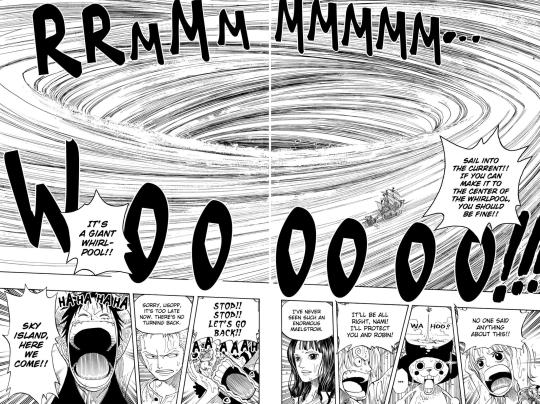
A ship might be stuck helplessly in the doldrums or ravaged by savage wind and waves. It is adventure and mystery, for no one knows what lies beyond the horizon or what lurks beneath the surface. It is the thing that separates us, but also the means by which we travel, enabling new connections and the exchange of trade, culture, and colonialism. Depending on their purpose for setting sail, ships of this era were one of the few places where people of vastly different national origins, languages, religions and cultures not only lived together in close proximity, but depended on one another for their livelihoods and survival. An excellent example of this in Romantic literature can be found in Moby Dick, where the American point of view character Ishmeal becomes fast friends with the Pacific Islander Queequeg while working on the international whaling crew.
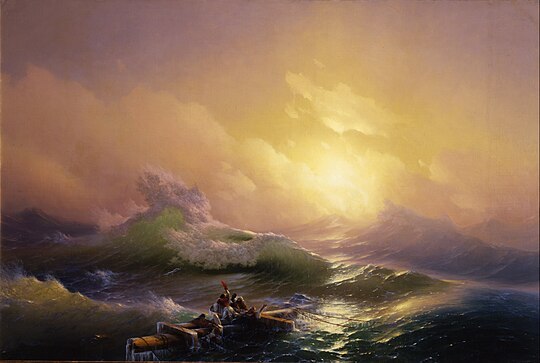
The sea can be feminine, the primordial mother of us all. Aphrodite was born of sea foam; mermaids, sirens, and nereids roam the waters to tempt, seduce, help, or destroy unwitting sailors. Ships are almost always referred to as she. Via the tides, the ocean is connected with the moon, also traditionally feminine. But the sea is also be masculine. Characters such as Old Man of the Sea, Poseidon, Oceanus were all male, as were the winds all ships depended on.
During the time that the Romantics wrote, sea-side vacations were increasingly prescribed as a health cure while sailors themselves suffered from ailments such as scurvy, typhus, and dysentery. Several poets reminisced longingly about their youthful childhoods swimming care-free in the sea. But the ocean is unfathomably ancient and supremely haunted by the souls of countless lives lost beneath its waves.
In Moby Dick, the titular whale could represent God, the Devil, or Nature itself. To Tennyson, the breaking of the waves represented grief. The journey across the sea in Rime of the Ancient Mariner deals with life and redemption. To Wordsworth, the sea was immortal. To Byron it was freedom. Shelley writes of the West Wind stirring the sea—and thus the dreamer—awake from a deep summer slumber. To quote Keats, “Oh, ye! who have your eyeballs vexed and tired/Feast them upon the wideness of the Sea”.
I could go on, but let’s not belabor the point. In light of this vastness of metaphor, it is fair to say that in One Piece that the sea isn’t representative of one single thing. The New Era is brought in with Whitebeard’s crashing waves during the Marineford War. The terrible power of the Agua Laguna shows the force of Robin’s darkness breaking the Straw Hats apart, while the stormy skies of that time show the turbulence going on within the crew. Sailing brings people of different cultures, societies, and ideas together, and that forced interaction can break down prejudice and foster understanding between different species and cultures, as shown in both the Fishman Island and Skypiean flashbacks.
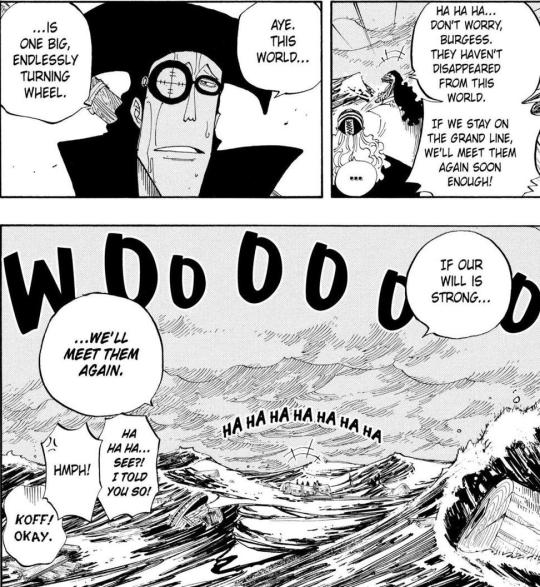
The Grand Line itself is portrayed as a cogwheel of fate, bringing the strong together in a clash of wills, and the limited navigational tools means that it is difficult, if not impossible to backtrack—you must live your life without regrets, and continue to move forward as you grow stronger as a person and crew. The sea represents the life of a pirate, often cruel, unfair, and dangerous but ultimately liberating. The promise of adventure exists somewhere beyond that unbroken horizon, a place of wonderland and dreams
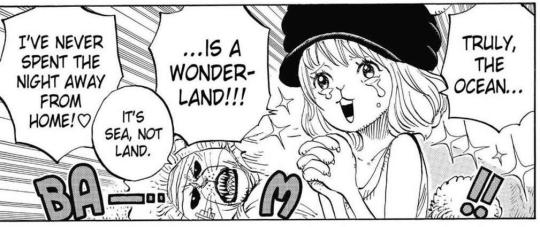
The World Government may rule over a hundred and seventy allied nations, but no one owns the sea. Thus, as Luffy says at Sabaody, the Pirate King isn’t about conquering anything, but to become the freest man in the world.
I would also be remiss not to mention that the Sea Metaphor of One Piece is incomplete, and will be until the secrets of the Devil Fruit are finally revealed. It is curious that the force that’s presented as the epitome of freedom completely rejects Devil Fruit users, including the one representing liberation. Egghead also added the interesting element of the sea being an existential threat to the entire world, when the destructive power of the sea over land had been previously limited. It would be interesting to revisit this topic after the series has ended to see how Oda resolves these seemingly competing ideas.
But if there is one metaphor I think rules above all else, it is the sea as home, specifically home for the outcast. Robin says during her flashback, even before the Buster Call comes, that she’s studying to become an archeologist in order to go out to sea with her mother. Her home life on Ohara is one of ostracization. Even the archeologists, who love her dearly, don’t let her in on their deepest, darkest secrets. This is for her own safety, but to an eight year old girl who’s been rejected by everyone else on her home island, even her own family, it’s enough for her to seek solace in the promise of the sea. Then, during the Buster Call, Saul promises her that in the vastness of the sea she will find friends, and she will find family, that no one is born to be alone. It’s a sentiment Reiju echoes to Sanji during the Whole Cake Island flashback.
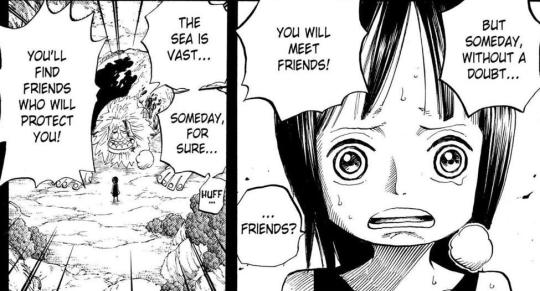
The sea is an escape. Most of the Straw Hats in one way or another have complicated relationships with their places of origin, and for many returning would be difficult if not impossible. Even a character like Nami, who is universally beloved by her hometown, spent eight years thinking that the people of Cocoyashi Village hated her, making her relationship with them relatively fraught while she was a member of Arlong’s crew. During that time the sea, and the treasure she found therein, was her only hope of freedom. The only Straw Hat who ends up staying behind has strong ties anchoring her to someplace other than the Going Merry. It’s not until hundreds of chapters and many real-world years later that an even greater force usurps Vivi from her homeland.
Similarly, fights with the marines and other enemies often end once the Straw Hats hit the open water. The society that tries to squeeze the citizens of the world into a specific shape loses its power over the boundless ocean. This is, of course, a double-edged sword. Water 7, the bandits of chapter 1, and Garp’s blackmail of Dadan show that it also deprives outlaws like Luffy the benefit of society’s protection. But those who refuse to conform to the whims and pressures of the world gain from fleeing to the sea, and what is to dream if not to refuse to conform in one way or another? Every single one of the Straw Hats want something that conventional wisdom says is impossible, but they search anyway, and in doing so find like-minded friends with which to band together. And like how a cord of rope is stronger than its individual fibers, together this found-family has the ability to challenge society and win, finding their own freedom in the process.
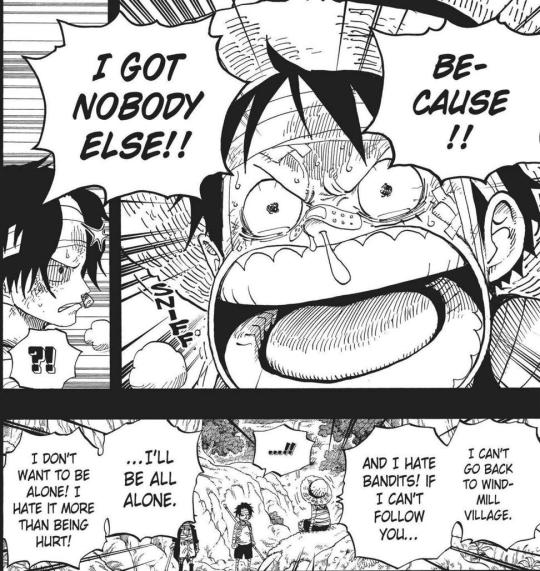
The reason I hone in on the Sea as Home metaphor so strongly over the more general Sea as Freedom metaphor is developed during Luffy’s post-Marineford flashback. It’s here while he’s forcibly befriending Ace that Luffy reveals to him that being alone is the worst pain in the world, worse than being punched all day by a grown man in spiked boxing gloves. It’s after this that he, Ace, and Sabo discuss the freedom of the seas and piracy, and the moment they become brothers. It is this desire for connection, the longing for the outcast to find their place with other outcasts, that drives Luffy to the sea in the first place. It’s there he finds his people, and while he’s not able to navigate, or cook, or do anything remotely useful on a sailing vessel, he’s able to protect the people flying under his flag. It’s a symbiotic relationship between captain and crew, a complete and total interdependence that is required when sailing the treacherous waters of the Grand Line.
During the Davy Back Fight, Luffy makes a prophetic statement when fighting Foxy that he’s willing to fight to the death for his friends. It’s an idea echoed during his fight with Bleuno on Enies Lobby, when the latter wonders how long Luffy will keep fighting against the combined might of the World Government. It’s the reason why the death of the Merry, the fight against Usopp, and Robin’s supposed betrayal is so devastating both for the reader and the Straw Hat Pirates. The found family that had developed over the course of the manga has ruptured, and they lost the ship with which they’ve called home.
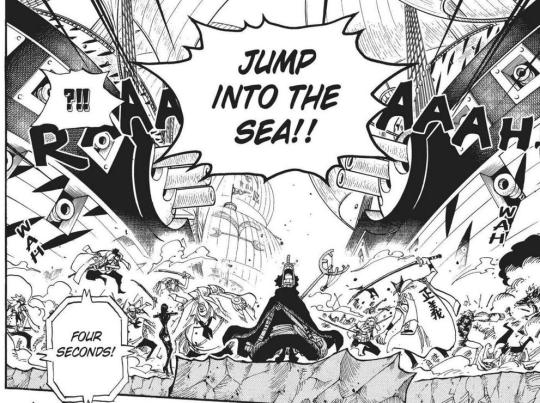
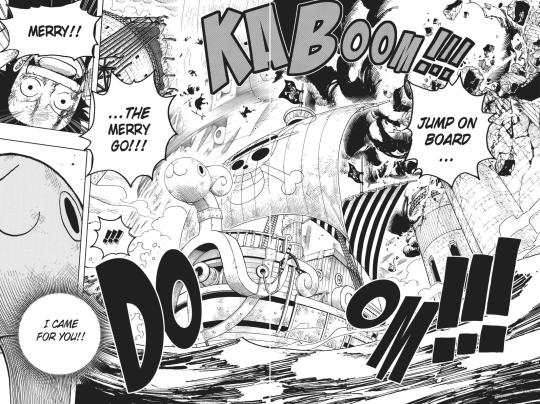
The Water 7 Saga ends with a reconciliation between brothers and their home built anew, this time stronger and more able to weather the stormy waters that wait ahead, the peaceful lamb exchanged for a fearsome lion with a mane as bright as the sun. Nothing has challenged the internal fortitude of the Straw Hat Pirates quite like that saga and nothing ever will again, because both their home and family has been forged into something unbreakable, allowing them to sail the sea, and pursue their freedom, any way they wish.
Conclusion and Final Thoughts
”Then stirs the feeling infinite, so felt in solitude, where we are least alone”—Lord Byron
I want to end on this point, because despite all the similarities between the Romantic movement and One Piece, in this we see one great difference. For all that the characters in Moby Dick are forced to depend on one another and the good judgement of their captain to survive, the book ends with everyone except Ishmael dead. Romantic poetry calls for solitary contemplation, and the landscapes of this era diminish the individual in favor of the wide, open spaces of nature. The zeitgeist of the age celebrated the misunderstood, melancholic genius. If One Piece were written during this time, Luffy would never have been the main protagonist. The rise of the Byronic hero would have made sure that honor went to a darker, more brooding character like Law or Ace.
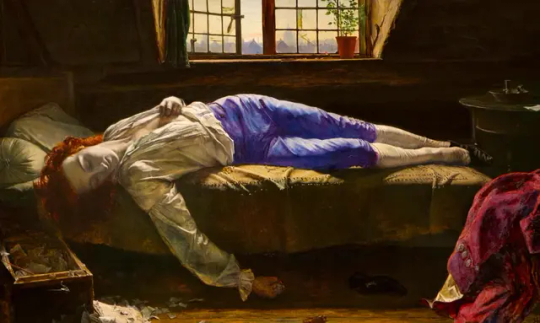
In 1770, a boy of 17 named Thomas Chatterton committed suicide in his small garret apartment. Having grown up fatherless and in poverty, this young genius of a poet was unable to scratch out a living with his writing, and after battling both depression and the pressure of changing his profession, he instead chose to end his own life.
The death of Chatterton sparked a cult following. His life and death would be commemorated in art, plays, and operas, with poets like Wordsworth, Coleridge, Shelly, and Keats all dedicating works to his name. His influence can still be felt today in the trope of the suffering arts that he and countless others helped codify.
One Piece is the story of a boy who rejects the confines of society in search of his own freedom, but he does not do so alone. Luffy is driven as much by the desire to be with his friends as he is by his desire to find the One Piece. The series agrees that risking death is an acceptable part of chasing one's dream, but rejects the notion that it should be sought out or celebrated. In One Piece, it’s better to live an undignified life in the hope of a better tomorrow than to give into an easy death.
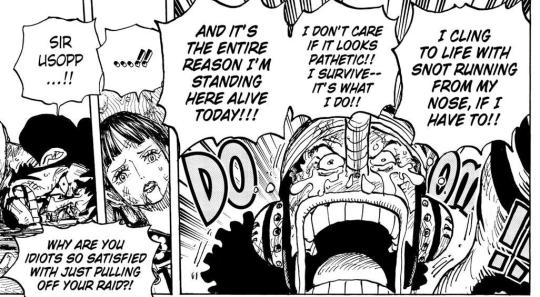
It is ironic that for all that the Romantics emphasized the self, many were friends with one another, Wordsworth and Colridge collaborated in writing Lyrical Ballads. Mary and Percy Shelly were married, and Mary Shelly famously wrote Frankenstein while on a retreat with Lord Byron. The German Romantic movement kickstarted with a group of men who wrote and studied together at the University if Jena, with similar groups later popping up in Berlin and Heidelberg. The American Transcendentalists even formed a club, with Thoreau only able to conduct his two year stint in the woods because the property was owned by Ralph Waldo Emerson, while his mother did his laundry.
One Piece recognizes that genius is not a solitary venture. Those seeking their freedom cannot and should not do so alone. Existence isn’t a crime, the sea is vast, and your people are out there somewhere.
There are of course other differences. One Piece is written in a post-nuclear, modern world. Among other things, the mysterious, idealized past of the Void Century is not one of primitive nature but hyper-advanced technology, and the progress of man is something to be embraced rather than rejected.
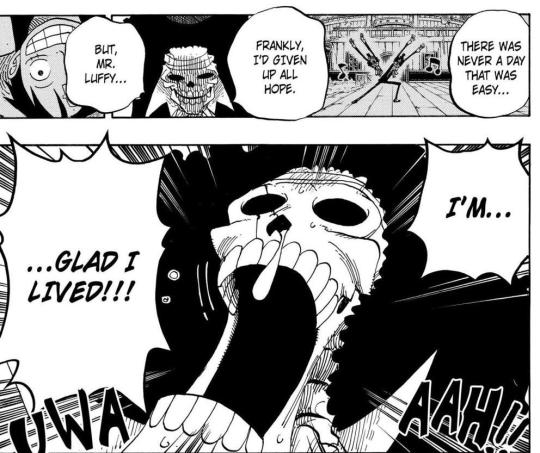
Yet the biggest difference I keep circling back to is One Piece's unabashed celebration of life. At the end of the day, it’s a story meant to make people laugh. Oda is unafraid of plunging into the depths of despair and tragedy, but he doesn't linger there before pulling the reader back into joy.
LP Hartley once wrote that, “The past is a foreign country; they do things differently there”. One Piece can never be mistaken as a story of the historical Romantic movement. There’s just too much difference between the world of today and the one where these works came. But I hope that I've shown how it carries some of that legacy into the present day. Intentionally or not, Oda has taken an old idea and used it as a guardrail for the entire series. Like the sun, guiding the dawn of a new era. The dawn of Romance, if you will.
A Romance Dawn.
89 notes
·
View notes
Text
scorpion's heart
Sometimes while thinking about TBHK thoughts will run through my head that I realize aren't universal among the fandom. I have actually touched upon this topic before, but I still wanted to make a quick post for the uninformed about an official parallel drawn between Tsukasa and a moment in a beloved piece of Japanese literature.
Night on the Galactic Railroad is a classic Japanese novel often taught in Japanese classrooms, similar to how English classics will often be taught in the Anglosphere. It's well known in Japan for this reason, and for the sake of this post I'll assume you either haven't heard of it or that you don't know much about it. Regardless, this post is centering on only a small portion of the novel, so you won't come away from it with a total understanding of what it's all about. I encourage you to check it out yourself!
As you might be able to tell by the name, the story involves a boy riding a train through a fantastical version of outerspace. During his trip through the cosmos, he meets others riding the train. One of these people tells him the story of Antares, the brightest star in the constellation Scorpio. Already there is one connection to the story of Hanako-kun, that being Amane's infamous monologue about the star during the Picture Perfect arc.
The story goes as follows: a scorpion was being chased by a weasel. In a last ditch effort to escape the weasel, it threw itself into a well. But the scorpion had no means of escape, and realized it was going to die there. The scorpion bemoans this fate, because as a predator it has only ever taken life away. It regrets not taking the chance to help the weasel, even if it would only help the weasel live a single day longer. And now the scorpion is going to die having helped no one.
So it prays to God, and asks that its body be used to bring happiness to everyone. And as if God had heard its plea, the scorpion's body burst into a brilliant red flame. This same light is said to be the star Antares, the heart of the Scorpio constellation.
...so! Already somewhat superficially you can compare this story to Tsukasa and the Red House. Little guy jumps into hole/well,
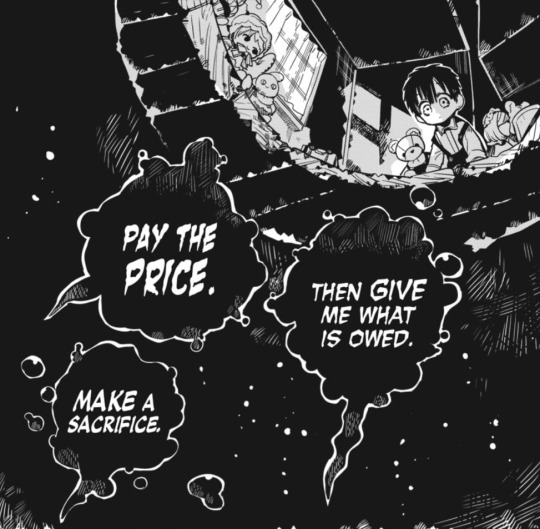
little guy makes a wish to a God to bring happiness to others,
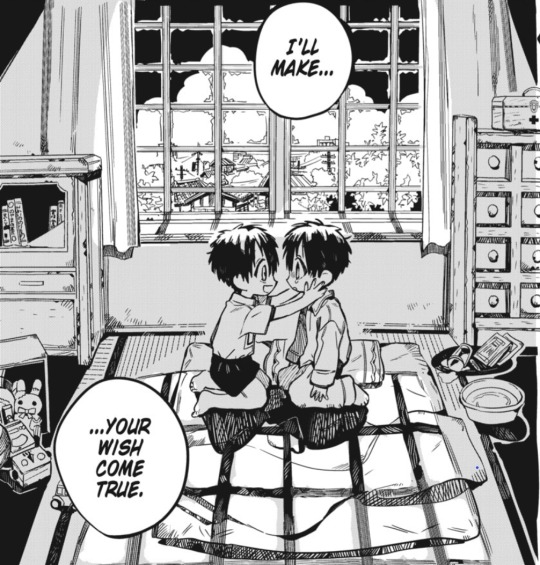
little guy bursts into flames...
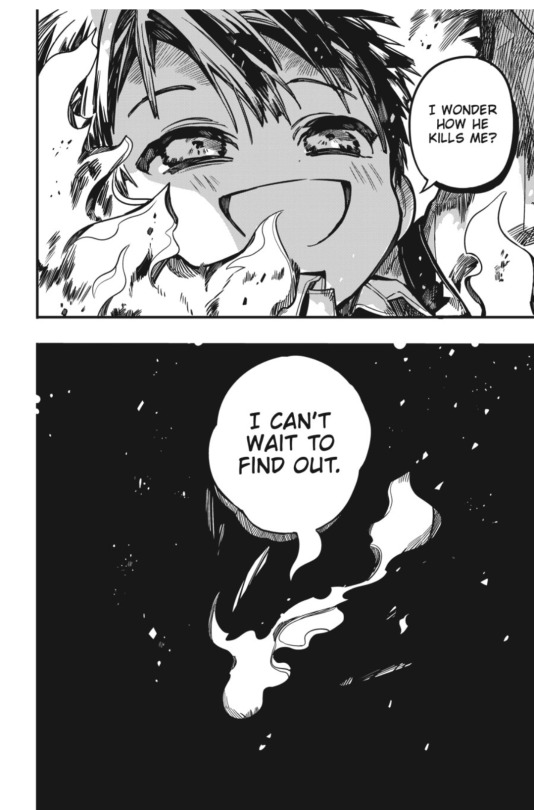
Personally I find these alone to be staggering similarities, but it leaves you asking: What is the significance of this?
Well, I tend to interpret it as a reflection of Tsukasa's selflessness. I think Tsukasa's intentions as a child were very pure. But later on it seems like this selflessness distorts into something else, something more twisted. Regardless, Tsukasa's motivations involve destroying himself for other people's happiness. His own destruction will bring happiness to Sakura (she needs all the yorishiro to be destroyed to have her wish granted) and also Amane, who has a wish of his own he wants granted.
Anyway, besides Amane comparing himself to Antares in Picture Perfect, we also have this official Night on the Galactic Railroad AU art with Tsukasa bearing the tail of the scorpion:

Note the red flame on the tip of his stinger. (And most importantly note his cuteness. 🦂🔥❤️)
Touching briefly upon Amane's Antares story in Picture Perfect, there aren't many obvious comparisons to draw between it and Night on the Galactic Railroad. However, one thing I'll touch upon is how Antares is a binary star, or a "twin star." It being a binary star isn't talked about in Night on the Galactic Railroad, but Amane mentions it. He also mentions how you can't normally see its twin. This is because its twin is a main sequence star, much less bright than the red supergiant Antares. It was only ever discovered that Antares had a twin when the moon covered the red supergiant and an astromer spotted the main sequence star beside it. Perhaps Amane and Tsukasa are supposed to represent the red flame of Antares in different ways, but it does make me wonder if Amane is meant to represent the little main sequence star too, since Tsukasa is very clearly the red flame in this story. But considering Amane's analysis of Antares is so much more scientific than the fantastical version seen in Night on the Galactic Railroad, I think it's safer to regard these as fundamentally separate stories. Still fun to consider however.
But if we did want to talk about the scientific implications of Tsukasa being Antares, I'd bring up how red supergiants often become black holes, almost the antithesis of what the scorpion wanted to become. The scorpion wanted to bring light and happiness to everyone, but a black hole only devours and destroys, just the thing the scorpion didn't want to be anymore. I don't think Tsukasa started in the same place as the scorpion, who regretted its life of selfishness... but it makes me wonder if he's meant to be the anti-scorpion: a selfless being becoming a black hole of destruction. That's a very sad way of looking at things, but it's hard not to think of it when we see what's happened to him in the series as a whole:

In the context of Night on the Galactic Railroad, the scorpion is regarded as a selfless hero. Although another character expresses distastes for dangerous creatures like the scorpion, the character who tells the Antares story argues that the scorpion is a fundamentally good creature. It's another one of those little things in Hanako-kun that reminds me that Tsukasa, for all his faults, has good inside him too. But it does leave me wondering how far this comparison will go, and what that means for Tsukasa's fate. Will he continue to sacrifice himself till the end? And will that sacrifice be for the good of everyone, or only a few?
My favorite part about all this is there's no answer! It's just a fun comparison AidaIro made that helps recontextualize Tsukasa's character. Is this a meaningful comparison, or just a surface-level one? Will his story end the same way as the scorpion, or will he subvert expectations? Who knows! I mostly just think back on it and remember that Tsukasa started as an extremely selfless character that still displays these traits in the manga today, even as a nefarious ghost. Maybe he is isn't misunderstood like the scorpion, but he's certainly just as tragic. Thanks for reading!
116 notes
·
View notes
Note
WIBTA If I named my twin boys after Jekyll and Hyde?
I (37F) am currently pregnant with twin boys. My husband (36M) and I had made an agreement when we started trying for a baby that of the 4 kids we wanted, I would name the first two and he would name the second two. Obviously if the name was TOO ridiculous, it could be veto’d, but overall it’s a pretty clear plan.
He named our first daughter (2F) when she was born and her name is Juliet, after Romeo and Juliet. We’re both huge fans of Shakespeare and while I loved the book, I disliked the name Juliet at first. It’s grown on me a lot because of my daughter, but I didn’t want her to be named that at first and still respected the agreement we had made anyway.
When I found out I was pregnant again, I was really excited and started planning baby names. I’m really big into sci-fi and classics and wanted to stick with a literature theme. When I found out that I was having twin boys, Henry and Edward seemed like perfect names! They’re a reference to Henry Jekyll and Edward Hyde, but arnt something super cheesy or obvious. We have middle names already picked out from family traditions, so unless we told people it would be hard to guess the names origin. Plus, Jekyll and Hyde had a big impact on me as a weird teenage girl and I love that book.
The problem is that my husband absolutely HATES the name. He thinks that it’s going to lead our sons or other people to stereotype them based on which character they’re named after, and that Edward would be socially set up to be seen as like worse. I understand what he means, but it’s hard for me to believe it would that THAT big of an impact socially speaking because no one would really know the reference. I kind of understand where he’s coming from in the context of the boys comparing themselves to each other, but personally Hyde was always a character more based on being who you are, even if it’s not what’s “pretty” or “normal”, and I don’t really believe the interpretation that Hyde represents pure evil. I feel like if we raised our boys with this idea, they wouldn’t think of one as the “good” twin and the other as the “evil” twin.
I told all this to my husband, and we both see where the other person is coming from, and we’re kind of at an impasse. This book got me through high school, and is one of my favorite pieces of media EVER. He hasn’t veto’d the name, but I still feel a little bad about the whole thing. I think the names will grow on him eventually, but who knows.
241 notes
·
View notes
Text
Closet Witchcraft: How To Get Witchy When You Can't Come Out Of The Broom Closet
Some basic/general tips for being a closet witch. (If you are in a severely abusive household, be sure to scroll down to the end.)
Cultivate some skills
Many skills can be put to witchy purposes if you're determined. Consider gardening, cooking, sewing, crochet, scrapbooking, painting, drawing, calligraphy, woodworking, carving, or literally any craft skill you can start practicing. If you knit a scarf with colors chosen for their magical symbolism or make a little owl sculpture as a charm to help you retain knowledge, nobody but you has to know.
Study and learn about nature
Start learning about plants, animals, geology, ecology, or whatever catches your interest. Get into the habit of observing nature wherever you are, and observing how humans and nature interact and affect each other.
Use everyday items where you can
You can practice divination with poker cards or dice, and your phone can serve as a scrying mirror. You can use a pendant or metal washer for pendulum divination.
As for cleansing, a literal wash in water is fine for any object that won't get damaged. You can use literally any cleaning tool or method with magical intent.
You can use your fingers in place of prayer beads, using either whole fingers or individual knuckles.
You can also use your fingers to trace symbols and runes on stuff.
You can represent your deities using art or knickknacks representing their symbols, like a small cat statue for Bast.
On keeping witchy literature (grimoires, Books of Shadows, printed books, etc.)
Keeping an online grimoire/BOS and getting witchy books in ebook format is often a good option.
Certain methods of practice can also reduce the amount of literature you need to keep on hand. (For example, learning correspondence through observation, using this model of deity/entity work, or practicing energy work.)
If no one is likely to go through your things, keeping your grimoire/BOS in a plain three-ring binder may be enough to avoid detection. (Camouflage is a great friend when hiding things.)
More on hiding things
So you might want something a little fancy, like a tarot deck or a more witchy-looking piece of decor.
If people aren't likely to go through your stuff or come in without knocking, you can keep a lot of things in a drawer or small storage box when you have to. Simple padlocks will be enough to keep small children and the typical casual guest out of your things.
To hide small objects, you can also get an opaque vase and fake flowers, put your witchy stuff in the bottom of the vase, and put the flowers on top.
You can also place a toilet paper tube inside a glass jar and fill it with something like small rocks, seashells, beads, buttons, or candies. (There's a tutorial for this kind of here. Though you won't need to wrap the toilet paper tube in wrapping paper, of course.)
If the jar is higher than the tube, you can glue a circle of cardboard to the bottom of the tube so you can rest it on top a layer of your filling so that it comes up to the jar's mouth.
If you want to use something like a sauce jar and want to take the label off completely, remember that oil will dissolve the adhesive.
Stuffed animals can be turned into hiding spaces. There are many tutorials out there for this.
Pieces of paper can be slipped into books. Thus you can conceal witchy reference sheets.
If you are in a seriously unhealthy situation
I wrote the above with people who don't live in severely abusive homes in mind. Like maybe the people you live with would flip out if they discovered that you're practicing witchcraft and maybe then you might be in danger, but they aren't likely to go snooping through all of your stuff and aren't going to hurt you because you breathed wrong. If you do live in a highly abusive household, I recommend checking out my post "I'm in a bad place and need to get out, what can I do?" and checking out this thread of abusive home survival tips. (These aren't witchcraft resources - they're resources to help you survive and escape.)
82 notes
·
View notes
Text
Who is Apollo?
Hello again, and welcome to another installment of "Introduction to the Hellenic Gods"! Today's deity is *drum roll* Apollo! He was the next alphabetically but Apollo is also another deity I have worked with myself and have a strong connection to.
---
Apollo is the name given to the ancient Greek god of oracles, healing, archery, music and the arts, and light. The Roman equivalent of Apollo is also named Apollo (makes things easy).
---
Apollo, unlike Aphrodite who we spoke of before, has one main birth myth.
The story actually begins with a Titaness named Asteria. Asteria, in an attempt to escape the god Zeus' advances, threw herself into the ocean. Where she entered the sea, a piece of disconnected land was created.
Later, when the goddess Leto was impregnated by Zeus, she was cursed by Zeus' scornful wife, Hera, to not be able to give birth on any piece of land or island. While searching for a place to give birth, Leto discovered this piece of disconnected land and gave birth to her two twins, Apollo and Artemis. This piece of land was then connected to the earth by Apollo himself and was named Delos. (For anyone wondering, yes I will be covering Artemis in this series very soon!)
---
Apollo was also known by many different epithets throughout Greece and Rome. By far, the most common and most used of the epithets is Phoebus Apollo, translated roughly as Bright Apollo. This is most likely why Apollo is so heavily connected to and is seen as the god of light.
---
Some interesting facts about Apollo you might not have known:
Apollo is also sometimes represented as the god of disease, and when praying to him, people would not pray for healing but instead would pray to be protected from the disease he was sending their way. This is actually seen in the first book of Homer's Iliad, where Apollo sends down a plague of arrows on the Achaeans for kidnapping the daughter of a priest of his.
Apollo wasn't always the god of the sun. This title actually belonged to Helios but over time the two were combined into one deity and/or Apollo was seen as the sun god while Helios was instead seen as the sun personified.
Apollo is a prime example of LGBTQ+ identities being present far before the start of the modern era as there are many myths and legends about the god being attracted to and being in relationships with people of the same sex such as his relationship with Hyacinthus or his relationship with Cyparissus.
---
My favourite pieces of art and literature that depict Apollo!:
Apollo Belvedere by Leochares --> This statue depicts Apollo and is a copy of the original bronze statue. It is currently held in the Vatican
The Iliad by Homer --> In Book 1 of this epic, the god Apollo sends down a plague on the Achaean soldiers for kidnapping the daughter of a priest of his
Kylix of Apollo --> This piece of traditional Greek pottery depicts the god Apollo sitting on a chair pouring out wine and holding the instrument most connected with him, the lyre
---
Thank you all so much for the support so far on this blog! I apologize for such a late update but I was super busy today hanging out with some friends I haven't seen in such a long time and spending much needed time with my partner! I thank Aphrodite for giving me such a lovely partner who is willing to spend hundreds of dollars on Florence + the Machine posters for me lol!
#witchblr#baby witch#beginner witch#hellenism#witchcraft#hellenic pagan#deity work#deity worship#hellenic deities#apollo deity#apollo#phoebus apollo#aphrodite deity#hermes deity#hypnos deity#deities#greek deities#gods and deities#paganblr#pagan witch#paganism#pagan#polytheism#hellenic worship#hellenic gods#hellenic polytheism#witch#witches#witch community#witchy vibes
147 notes
·
View notes
Text
< I Don’t Think It’s Talked About Enough. . . - Creative Edition >
I don’t think it’s talked about enough when a Creative has the itch to create but cannot put anything down . For example , writing . The Creative may know the exact sequence of events to occur in a scene but once the document or paper is ready , nothing comes out .
I don’t think it’s talked about enough that a Creative listening to music is important when creating art or a story . The beat , the lyrics , the vocals , it all connects with the stories . We are most likely daydreaming which characters are doing what based on a song and it guides us to exactly where we need to go .
I don’t think it’s talked about enough that when a Creative presents you their art or story , they trust you with a piece of themself . Some Creatives ( like myself ) have been working on one or more stories for over ten years . We have continued to develop , create , and destroy our stories over and over and over and over and over and over and over again because they aren’t exactly our children. . .
But a part of us . We change thus our stories did .
I don’t think it’s talked about enough when a Creative shows you their work and once a slight uninterested appearance or words are exchanged , we either close the story(ies) , put our sketch books away , and try to conceal it . I think of it as the same feelings of being rejected or even abandoned by those you present it to . These creative endeavors are a literal part of our dedication , our spirit , and when we are told “ we’re being too much ” , “ It’s weird / We’re weird . ” , “ It’s dumb . It’s too complicated . It’s too. . . ”
I think in some cases , it’s suppose to be that way . Humans are complicated , and it’s represented in our creativity .
I don’t think it’s talked about enough that sometimes Creatives grow apathetic of their own work(s) . We stay up late nights writing , drawing , crafting . Our brains don’t stop thinking about how the characters need this or that , how they get to it , why didn’t it work , what happens next , how does this character work or fight with this character ? The plot needs this for the theme , shoot what’s the theme mean in literature , this happens in the world and how does that affect the world , creatures , and characters ? Shoot what was that word again. . . ?
Stopped .
I’m staring at the screen .
Were these stories worth it ?
Was my years of dedication all for nothing ?
Am I even worth it ?
I mean , come on , msbutterfly5294 , you have drawn some awesome pieces for the these stories ! I mean , look at these papers filled with words that blend and make sense , the stories can capture mystery and emotion , descriptions are great ! Why don’t you continue ?
Because. . . It’s a beautiful disease much like love . It infects the entirety of us . I remember the many nights my big brother ( who is my cousin ) came over to show us Legend Of Zelda games and he would tell me all about his stories , lore , world building and characters . That was years ago as a very young teenager to late teens . I don’t fully know when he started his journey , but I know he loves those characters and stories with all his heart .
And by stars , it is beautiful to know someone with that much passion . He inspired me to follow my dreams along with my big sister ( also my cousin ) . She taught me art and resilience , he taught me storytelling and dedication .
I wouldn’t be here today without them .
. . . I don’t think it’s talked about enough. . . That a Creative wouldn’t be here today without those beautiful people who do care and encourage them to keep creating . Keep being passionate . Keep writing . Keep drawing .
Keep being you .
And be proud of it .

#creative blog#writer blog#artist blog#creatives on tumblr#writers on tumblr#artists on tumblr#creative community#writer community#artist community#creative#creativity#creative advice#creative writing#creative process#write#writeblr#writer stuff#on writing#how to write#writing advice#art#artist#artwork#oc art#traditional art#not talked about enough#creative edition#talk about it#we the creatives#today is now
89 notes
·
View notes
Text

A Nazi rally held in Madison Square Garden, February 20th 1939
* * * *
LETTERS FROM AN AMERICAN
October 21, 2024
Heather Cox Richardson
Oct 22, 2024
On Saturday, September 7, Republican presidential candidate Donald Trump predicted that his plan to deport 15 to 20 million people currently living in the United States would be “bloody.” He also promised to prosecute his political opponents, including, he wrote, lawyers, political operatives, donors, illegal voters, and election officials. Retired chair of the Joint Chiefs of Staff Mark Milley told journalist Bob Woodward that Trump is “a fascist to the core…the most dangerous person to this country.”
On October 14, Trump told Fox News Channel host Maria Bartiromo that he thought enemies within the United States were more dangerous than foreign adversaries and that he thought the military should stop those “radical left lunatics” on Election Day. Since then, he has been talking a lot about “the enemy from within,” specifically naming Representative Adam Schiff and former House speaker Nancy Pelosi, both Democrats from California, as “bad people.” Schiff was the chair of the House Intelligence Committee that broke the 2019 story of Trump’s attempt to extort Volodymyr Zelensky that led to Trump’s first impeachment.
Trump’s references to the “enemy from within” have become so frequent that former White House press secretary turned political analyst Jen Psaki has called them his closing argument for the 2024 election, and she warned that his construction of those who oppose him as “enemies” might sweep in virtually anyone he feels is a threat.
In a searing article today, political scientist Rachel Bitecofer of The Cycle explored exactly what that means in a piece titled “What (Really) Happens If Trump Wins?” Bitecofer outlined Adolf Hitler’s January 30, 1933, oath of office, in which he promised Germans he would uphold the constitution, and the three months he took to dismantle that constitution.
By March, she notes, the concentration camp Dachau was open. Its first prisoners were not Jews, but rather Hitler’s prominent political opponents. By April, Jews had been purged from the civil service, and opposition political parties were illegal. By May, labor unions were banned and students were burning banned books. Within the year, public criticism of Hitler and the Nazis was illegal, and denouncing violators paid well for those who did it.
Bitecofer writes that Trump has promised mass deportations “that he cannot deliver unless he violates both the Constitution and federal law.” To enable that policy, Trump will need to dismantle the merit-based civil service and put into office those loyal to him rather than the Constitution. And then he will purge his political opponents, for once those who would stand against him are purged, Trump can act as he wishes against immigrants, for example, and others.
Ninety years ago, as American reporter Dorothy Thompson ate breakfast at her hotel in Berlin on August 25, 1934, a young man from Hitler’s secret police, the Gestapo, “politely handed me a letter and requested a signed receipt.” She thought nothing of it, she said, “But what a surprise was in store for me!” The letter informed her that, “in light of your numerous anti-German publications,” she was being expelled from Germany.
She was the first American journalist expelled from Nazi Germany, and that expulsion was no small thing. Thompson had moved to London in 1920 to become a foreign correspondent and began to spend time in Berlin. In 1924 she moved to the city to head the Central European Bureau for the New York Evening Post and the Philadelphia Public Ledger. From there, she reported on the rise of Adolf Hitler. She left her Berlin post in 1928 to marry novelist Sinclair Lewis, and the two settled in Vermont.
When the couple traveled to Sweden in 1930 for Lewis to accept the Nobel Prize in Literature, Thompson visited Germany, where she saw the growing strength of the fascists and the apparent inability of the Nazi’s opponents to come together to stand against them. She continued to visit the country in the following years, reporting on the rise of fascism there, and elsewhere.
In 1931, Thompson interviewed Hitler and declared that, rather than “the future dictator of Germany” she had expected to meet, he was a man of “startling insignificance.” She asked him if he would “abolish the constitution of the German Republic.” He answered: “I will get into power legally” and, once in power, abolish the parliament and the constitution and “found an authority-state, from the lowest cell to the highest instance; everywhere there will be responsibility and authority above, discipline and obedience below.” She did not believe he could succeed: “Imagine a would-be dictator setting out to persuade a sovereign people to vote away their rights,” she wrote in apparent astonishment.
Thompson was back in Berlin in summer 1934 as a representative of the Saturday Evening Post when she received the news that she had 24 hours to leave the country. The other foreign correspondents in Berlin saw her off at the railway station with “great sheaves of American Beauty roses.”
Safely in Paris, Thompson mused that in her first years in Germany she had gotten to know many of the officials of the German republic, and that when she had left to marry Lewis, they offered “many expressions of friendship and gratitude.” But times had changed. “I thought of them sadly as my train pulled out,” she said, “carrying me away from Berlin. Some of those officials still are in the service of the German Government, some of them are émigrés and some of them are dead.”
Thompson came home to a nation where many of the same dark impulses were simmering, her fame after her expulsion from Germany following her. She lectured against fascism across the country in 1935, then began a radio program that reached tens of millions of listeners. Hired in 1936 to write a regular column three days a week for the New York Herald Tribune, she became a leading voice in print, too, warning that what was happening in Germany could also happen in America.
In an echo of Lewis’s bestselling 1935 novel It Can’t Happen Here, she wrote in a 1937 column: “No people ever recognize their dictator in advance…. He always represents himself as the instrument for expressing the Incorporated National Will. When Americans think of dictators they always think of some foreign model. If anyone turned up here in a fur hat, boots and a grim look he would be recognized and shunned…. But when our dictator turns up, you can depend on it that he will be one of the boys, and he will stand for everything traditionally American.”
In less than two years, the circulation of her column had grown to reach between seven and eight million people. In 1939 a reporter wrote: “She is read, believed and quoted by millions of women who used to get their political opinions from their husbands, who got them from [political commentator] Walter Lippmann.” The reporter likened Thompson to First Lady Eleanor Roosevelt, saying they were the two “most influential women in the U.S.”
When 22,000 American Nazis held a rally at New York City’s Madison Square Garden in honor of President George Washington’s birthday on February 20, 1939, Thompson sat in the front row of the press box, where she laughed loudly during the speeches and yelled “Bunk!” at the stage, illustrating that she would not be muzzled by Nazis. After being escorted out, she returned to her seat, where stormtroopers surrounded her. She later told a reporter: “I was amazed to see a duplicate of what I saw seven years ago in Germany. Tonight I listened to words taken out of the mouth of Adolf Hitler.”
Two years later, In 1941, Thompson returned to the issue she had raised when she mused about those government officials who had gone from thanking her to expelling her. In a piece for Harper’s Magazine titled “Who Goes Nazi?” she wrote: “It is an interesting and somewhat macabre parlor game to play at a large gathering of one’s acquaintances: to speculate who in a showdown would go Nazi,” she wrote. “By now, I think I know. I have gone through the experience many times—in Germany, in Austria, and in France. I have come to know the types: the born Nazis, the Nazis whom democracy itself has created, the certain-to-be fellow-travelers. And I also know those who never, under any conceivable circumstances, would become Nazis.”
Examining a number of types of Americans, she wrote that the line between democracy and fascism was not wealth, or education, or race, or age, or nationality. “Kind, good, happy, gentlemanly, secure people never go Nazi,” she wrote. They were secure enough to be good natured and open to new ideas, and they believed so completely in the promise of American democracy that they would defend it with their lives, even if they seemed too easygoing to join a struggle. “But the frustrated and humiliated intellectual, the rich and scared speculator, the spoiled son, the labor tyrant, the fellow who has achieved success by smelling out the wind of success—they would all go Nazi in a crisis,” she wrote. “Those who haven’t anything in them to tell them what they like and what they don’t—whether it is breeding, or happiness, or wisdom, or a code, however old-fashioned or however modern, go Nazi.”
In Paris following her expulsion from Berlin, Thompson told a reporter for the Associated Press that the reason she had been attacked was the same reason that Hitler’s power was growing. “Chancellor Hitler is no longer a man, he is a religion,” she said.
Suggesting her expulsion was because of her old article disparaging Hitler, in her own article about her expulsion she noted: “My offense was to think that Hitler is just an ordinary man, after all. That is a crime against the reigning cult in Germany, which says Mr. Hitler is a Messiah sent by God to save the German people…. To question this mystic mission is so heinous that, if you are a German, you can be sent to jail. I, fortunately, am an American, so I merely was sent to Paris. Worse things can happen….”
LETTERS FROM AN AMERICAN
HEATHER COX RICHARDSON
#Heather Cox Richardson#Letters From An American#nazis#Madison Square Garden#1930s#WWII#American History#fascism#world history#Dorothy Thompson#It Can't Happen Here#journalism#history#election 2024
62 notes
·
View notes
Text
Thinking about writing a piece of literature with a therian in it? AMAZING IDEA!! Here’s a quick tip:
Try writing something in which their therianthropy is not the main focus or struggle. Now, this doesn’t mean not to represent them struggling at all, struggling with your identity and physicality is a huge part of alterhumanity! Just make that a part of their character, and not the main plotline!
It is amazing and great to have books and fanfic and everything that represents us as the focus of the writing, but casual representation in different works of literature is part of what makes more accepting people. And it can be really fun to write a story and have real, full fledged characters within it, especially ones that are flawed, are strange, are not socially acceptable.
Have fun, and as always happy howling!
#day’s howls#wolf therian#wolf theriotype#caninekin#werewolfkin#writing advice#therianthropy#therian#alterhuman#alterhumanity
132 notes
·
View notes
Text
Sometimes I think about important Sayori from Doki Doki Literature Club is to me and get really emotional
As a bubbly kid with depression it was already really hard to find characters who acted like me, because depression in media is always portrayed in the same way. Tired eyes, never smiling, melancholic, dark clothes, baggy hoodies, etc. But that was never me. The only time I ever looked like the idea of what a depressed person looked like was when I got so depressed I almost had a mental breakdown.
I’m depressed, but I’m always smiling. I don’t like people knowing I’m upset, and if I think I’m about to cry I immediately leave the room or hide my face so people don’t see me crying. I don’t like people seeing me depressed, I keep that to myself and only let others get peeks of it through cracks in the foundations. I hide it because I’m genuinely a happy person, I like being sociable and funny, but it gets so hard sometimes to keep it up when everything feels like it’s weighing down on you. Thus, keeping that to myself.
So despite the fact there was so many depressed characters in the media I consumed growing up, I never felt like there was one who represented me. Even the characters who technically count in the “Depressed by happy” media I consume were never portrayed like me. They were always older women pretending to keep things together while on the brink of having a manic violent breakdown because they’re so unhappy with their postcard nuclear family.
Thus, this left me to project my feelings onto characters that reminded me of myself to make myself feel better.
Sayori was the first ever depressed character that made me feel seen. Every little detail felt like she was a love letter to 15 year old me. The way she kept up the mask around those she cared about so no one would worry about her, the way she slept all the time due to how exhausted she was, the bubbly personality that didn’t seem fake. She was everything I was asking for in a depressed character.
I know people love to get caught up with the “How’s it hanging” jokes or act like her depression was only there because of Monika messing with the game files, but Sayori was genuinely so important to me. When Doki Doki Plus came out with the side stories it just solidified the fact that Sayori is a very special character who acts very very similar to me.
To this day I’ve never consumed a piece of media with a depressed character as similar to me as Sayori. She meant the world to me as a really depressed teenager who felt really alone and different from everyone, and she still means the world to me.
#sorry for the long post; I just think about Sayori DDLC sometimes and she makes me wanna fucking combust#prince rambles in this chilies tonight#ddlc sayori#doki doki sayori#doki doki literature club sayori#doki doki literature club#ddlc#long post#tw depression#tw depressing thoughts
30 notes
·
View notes
Text
Matilda role analysis based on the latest event
THIS POST CONTAINS SPOILERS FOR FLOOR IT! TO THE GOLDEN CITY. YOU HAVE BEEN WARNED.
I have to start this off with definitions of archetypal roles in literature if only, to ease you into what I am trying to say: A Main Character is the player through whom the audience experiences the story first hand, a Protagonist is the prime mover of the plot, and a Hero is a combination of both Main Character and Protagonist.
With that in mind, I'd like to state: Matilda is a Main Character and Joe is the Protagonist. I could, of course, be convinced of Joe being of the Hero archetype—if only because we see his perspective in glimpses. Mercuria is considered none of them in my opinion though. In fact, I'd argue to say Mercuria simply plays a supportive role. She is not a side or minor role, but a supporting role. Integral to plot, but not the driving force itself.
The driving force has always been Joe after all. Whether it's when Legers sent Gio to gather information on Joe to get, "A slice of the New Age Market pie," or when he enters the local Foundation building to find his estranged sister Paulina. In fact, when he goes to the Foundation, he causes a chain reaction that leads our main character Matilda to take center stage in search of him. He makes plans and deals in the background, while having Mercuria defect to branch the gaps between Legers hand and his own.
Our eyes and ears are Matilda, and after a certain point what we know and see is from her perspective. From her perspective, we see Legers pressure Joe with Hollick's life. We see Joe lose favor unfairly through her eyes. We believe that the only people still on Joe's side is Pioneer, Catseye Wisen, and Matilda. We don't realize that Mercuria is releasing Legers from the Order of Enlightenment through easing his denial and grief of his dying twin brother. We don't see Joe making agreements in the background, and we certainly don't realize others had access to the Elysium through Joe's dealings. We only learn bits and pieces at the very end where it comes to a head. To the point I began considering Matilda and Matheus as narrative foils to one another. As both are outsiders to the New Age Market crew in varying ways.
In Matheus's case, he is a member of Manus Vindicatae running the Order of Enlightenment cult in the New Age Market. His goals were to drain followers of the cult of all their valuables, and turn them into mindless Manus Vindicatae followers. All of it was meant to be given in tribute to the Guiding One. While he did ensare many of the more vulnerable and gullible citizens within San Francisco's New Age Market area; he could not ensare Joe, Mercuria, Becket, Hollick, or Catseye Wisen. Their distrust of authority and outsiders prevented him from truly leaving the city in the wake of a tragedy. He was never one of them, nor could he ever truly steal anyone from the New Age Market's tightknit community.
Whereas for Matilda, she's from the Saint Pavlov Foundation, sent to capture Joe because he broke visitors confidentiality regulations. She starts off just as rocky as Matheus, but unlike Matheus, she earns the New Age Market crew's respect through her actions against the cult and Manus Vindicatae. Although, they do still keep at an arm's length in their plans. Matilda may have their respect in regards to her determination to help them, but they do not trust her succeed. Let alone get them back up from the Foundation. They believe they have to solve it themselves, and solving it exactly what they do. It is only in the epilogue that Joe lets her fully into the inner circle by giving her a badge representing the trust and respect she's earned from them.
In a way, Matilda proves to Joe that he can trust the Foundation to help through her willingness to sacrifice herself for his survival, and even at the behest of his pleas for her to do otherwise. Despite his attempts to prevent her sacrifice and his own likely demise, Matilda and Joe fall unconscious, unaware of what is to happen next. In those unseeing moments, Matilda's promises of Foundation backpack come to fruition. All of this convinces Joe to leave San Francisco's New Age Market to Legers to join the Foundation, and giving Matilda the badge that signifies her place within his community as his friend.
As the epilogue begins to shift, Joe's story as the Protagonist ends. Moving Matilda's role as the Main Character to slightly into the role of Hero, while she searches for the whereabouts of her mother. With that note, I am almost certain Matilda's will end up the Hero of a future patch. Her character arc is not yet over, just as it began in Mor Pankh and it will not end in San Francisco. I cannot wait to see where Bluepoch takes us with her as the game continues it's journey.
#reverse 1999#r1999#reverse 1999 event#matilda bouanich#r1999 Matilda#reverse 1999 matilda#floor it to the golden city#r1999 j#r1999 joe#reverse 1999 J#reverse 1999 Joe
30 notes
·
View notes